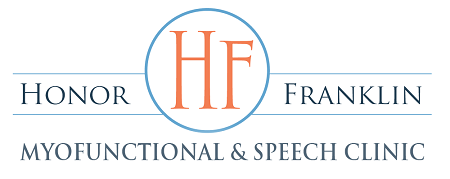Articulation Speech Disorders
 Sometimes, your child’s speech and language skills develop normally save for one problem – they fail to develop one or more speech sounds. Most children make some mistakes as they learn to say new words. A speech sound disorder occurs when mistakes pass a certain age. Every sound has a different range of ages when the child should make the sound correctly. This is an articulation speech disorder, and while the issue may be small, it may noticeably detract from a patient’s ability to communicate effectively, and teasing from peers could occur. In fact, this condition can follow them into adulthood. As a member of the American Speech-Language-Hearing Association (ASHA), Dr. Honor Franklin provides patients of any age articulation therapy for speech sound disorders, working closely with them so they can speak clearly and confidently. If you’re interested in scheduling a consultation, please contact our Dallas, TX office today. Patients from the nearby areas of Park Cities, Highland Park, North Dallas, Aubrey, Fort Worth, and beyond are welcome as well.
Sometimes, your child’s speech and language skills develop normally save for one problem – they fail to develop one or more speech sounds. Most children make some mistakes as they learn to say new words. A speech sound disorder occurs when mistakes pass a certain age. Every sound has a different range of ages when the child should make the sound correctly. This is an articulation speech disorder, and while the issue may be small, it may noticeably detract from a patient’s ability to communicate effectively, and teasing from peers could occur. In fact, this condition can follow them into adulthood. As a member of the American Speech-Language-Hearing Association (ASHA), Dr. Honor Franklin provides patients of any age articulation therapy for speech sound disorders, working closely with them so they can speak clearly and confidently. If you’re interested in scheduling a consultation, please contact our Dallas, TX office today. Patients from the nearby areas of Park Cities, Highland Park, North Dallas, Aubrey, Fort Worth, and beyond are welcome as well.
What are the signs of an articulation speech disorder?
The majority of errors that fall under articulation disorder include:
- Substitution- This occurs when the patient substitutes one sound for another sound (“wabbit” instead of “rabbit”)
- Omission- This occurs when a certain sound is completely dropped from a word (“at” instead of “cat”)
- Addition- This occurs when an additional sound is incorrectly added to a word (“pinka” instead of "pink")
- Distortion- This occurs when a sound is unusually distorted (“thoup” instead of “soup”)
What causes speech sound disorders?
 Many speech sound disorders occur without a known cause. Trying to determine the cause is not always conclusive. The cause may include one or more of the following: detrimental oral habits; problems affecting an adequate nasal airway e.g. unresolved enlarged tonsils/adenoids, hypertrophied nasal turbinates, allergies/asthma; neurological/development issues; and frequent ear infections in childhood are at risk if ear infections were accompanied by hearing loss. A child may not learn how to produce sounds correctly or may not learn the rules of speech sounds on his or her own. These children may have a problem with speech development, which does not always mean that they will simply outgrow it by themselves. Many children do develop speech sounds over time, but those who do not often need the services of an Speech-Language Pathologist to learn to correct speech sounds.
Many speech sound disorders occur without a known cause. Trying to determine the cause is not always conclusive. The cause may include one or more of the following: detrimental oral habits; problems affecting an adequate nasal airway e.g. unresolved enlarged tonsils/adenoids, hypertrophied nasal turbinates, allergies/asthma; neurological/development issues; and frequent ear infections in childhood are at risk if ear infections were accompanied by hearing loss. A child may not learn how to produce sounds correctly or may not learn the rules of speech sounds on his or her own. These children may have a problem with speech development, which does not always mean that they will simply outgrow it by themselves. Many children do develop speech sounds over time, but those who do not often need the services of an Speech-Language Pathologist to learn to correct speech sounds.
If your child is making errors when learning to speak at a young age, there’s no need to worry just yet. In young children learning to speak, speech sound errors are quite common. In fact, very few children develop speech without producing errors early on. However, once they’ve reached the age of eight, they should be able to produce all sounds in English correctly.
To see the age range during which most children develop each sound, visit Talking Child’s Speech Chart and to learn more about typical speech sound development, see How Does Your Child Hear and Talk?.
What kind of treatment is available for children or adults with speech sound disorders?
Dr. Franklin is happy to provide treatment that helps to improve a patient’s articulation. This may include working with them to create the correct sound, teaching them to make a distinction between certain sounds that are correct and incorrect, and practicing the same sounds in different words. She’ll work closely to develop an effective personalized treatment plan for both children and adults.
Can an Orofacial Myofunctional Disorder cause an Articulation Speech Disorder?
Yes, OMDs can cause articulation speech disorders. Research has revealed that of those individuals who exhibit OMDs, 81% have speech problems. The /s/ sound is the most noticed speech error; others are /z/, /sh/, /ch/, /j/, /t/, /d/, /l/, /n/, and /r/. Where there is a combination of an OMD and related speech errors, it is often difficult to correct the speech problems through traditional speech therapy.
It is possible to have an Orofacial Myofunctional Disorder (OMD) in conjunction with a speech problem, however not every individual with a speech problem will have an accompanying OMD. When there is an underlying OMD in conjunction with a speech problem and the underlying cause is not addressed, speech therapy can be compromised.
Contact our Dallas office to learn more! We welcome patients from Dallas, North Dallas, Denton, Frisco, Prosper, and throughout the DFW Metroplex.

